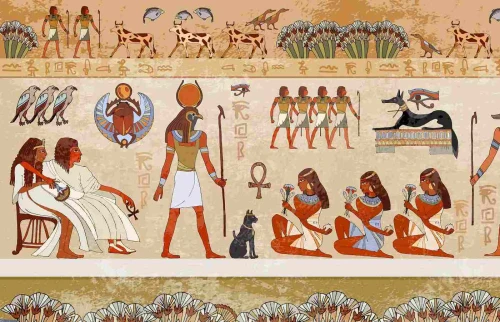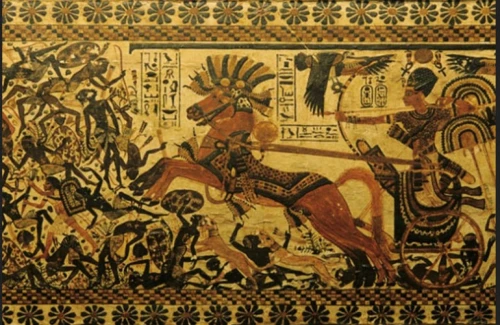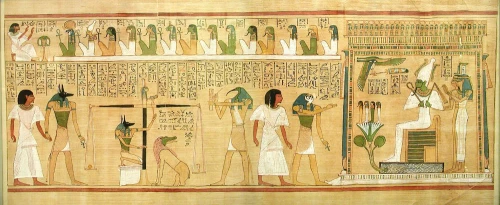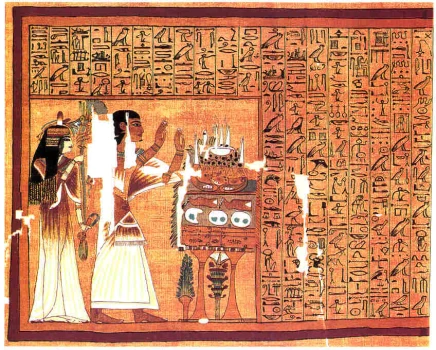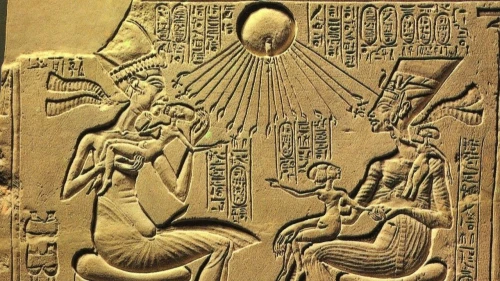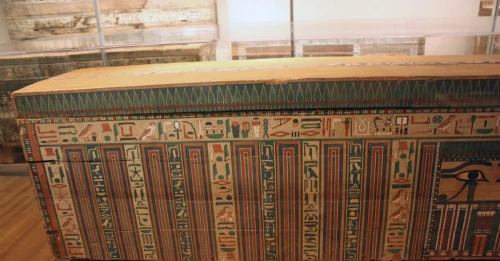
COFFIN TEXTS A collection of charms created by the magicians of the Middle Kingdom (2055 - 1650 B.C) to aid the departed
to the NETHERWORLD trip. The First Intermediate Period (2181 - 2055 B.C) of lawlessness that followed the fall of the Old Kingdom (2688 - 2181 B.C) saw the opening of the pyramids by thieves. The prayers and magical charms that enabled the king travel safely to the next world were finally visible to the people. The practise of writing prayers and charms on Middle Kingdom coffins must have originated when the magic spells, or Pyramid Texts, came to light.
One of the changes of the Coffin Texts is that OSIRIS, the god of the dead, who had become well-known as the Judge of the Underworld, now shared authority with the sun god RE, who had previously ruled the Underworld alone. The Coffin Texts also said that the dead would have to work in the FIELD OF REEDS. The Coffin Texts were a collection of diverse spells created to aid the dead in to the Netherworld; they were not organised or structured in any specific way. The spells were difficult to decipher because there wasn't much room for writing on the surface of the coffin, and frequently words or entire chapters were left out. More than a thousand coffin spells exist. but many are repetitious.
They frequently discuss magic or the magician's strength. The Coffin Texts mention both negative and good forms of magic. The charms ensure the deceased that people who might use harmful magic on him won't hurt him in the opposing group. The phrases "I will not listen to magic" and "my soul shall not be seized by magic" are found in these spells. In addition to worrying about "evil magic," there was also concern that a god dressed as a crocodile may seize the deceased's magic. The spell used to stop such a disaster was:
Come back! Leave now! You hazardous one, go back! Don't approach me and stop relying on magic, please! May I avoid having to reveal to the great god who permitted your arrival that you go by the names "Messenger" and "Bedjet."
The crocodile speaks:
You are facing righteousness. The stars were encompassed by the sky, the towns by the magic, and the magic was enclosed by this mouth of mine. My tusks are the Cerastes Mountain, and my teeth are flint.
Oh, you with a spine, who would work your mouth against this magic of mine, do not take it away, O crocodile, which lives by magic, the deceased responds.
The Coffin Texts contain spells that are not all harmful. Many are meant to demonstrate the deceased's magical prowess.
The goal of Coffin Texts was to ensure that the deceased made it securely to the Netherworld. There were charms to prevent a second death and avoid performing any labour in the hereafter. (Image courtesy of Sara Wells)
Frequently used in these expressions is "I have filled my belly with magic." The power of other magicians could occasionally be possessed by the deceased: "I consume their magic and ingest their abilities. Their strength cannot compare to mine. I have access to their powers."
Egyptians inserted spells to make sure their magic could not be taken so they could be certain that once they gained the power, they would not lose it.
Some of the spells in the Coffin Texts called for more than just words and gave guidelines for speaking the magic. The spell also demonstrates how the Egyptians perceived magic to operate. For instance, "May you break and overturn your enemy and set them under your sandals" is the final line of the spell to defeat enemies (Spell 37). According to the instructions provided, the enemy's name was to be inscribed with a cynodonts fish bone on the figure's heart while the words were to be shouted over it.
One of the most puzzling things about the Coffin Texts is that even though many gods were mentioned and invoked, neither Osiris, the god of the dead, nor the sun god Re, was the most significant one.
The main deity mentioned in the texts is the god of air. The Egyptians may have thought one had to cross the sky to enter the Netherworld, which is one explanation that has been proposed. Shu's assistance would be important in this situation. A frequent inscription on the coffins read, "I've visited Shu. I've ascended the sunbeams." Shu was a way of passage to the Netherworld for the dead as well as a representation of courage for them to endure the long journey: "I am strong as Shu is strong, I am hale as Shu is hale, I am underneath the sky, I reinforce its brightness."
Because the priests who composed the Coffin Texts were more focused on the voyage to the Netherworld than on what would occur once the deceased there, they place more emphasis on Shu than Osiris. The Netherworld is seldom mentioned in any of the Coffin Texts. It seemed as though the Egyptians' main worry was avoiding dangers that would cut short their voyage or weaken them; once they reached the west, they would be safe. The Middle Kingdom was where The Coffin Texts were most widely read. They were replaced by the more complex BOOK OF DEAD during the New Kingdom.
 English
English
 Spain
Spain




